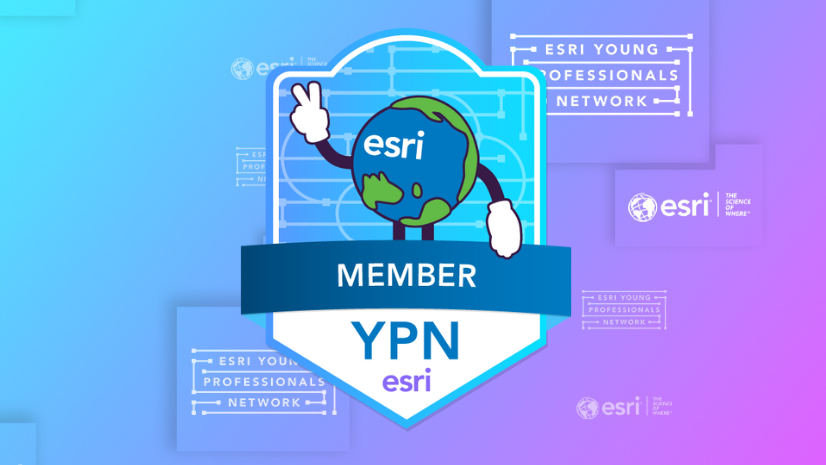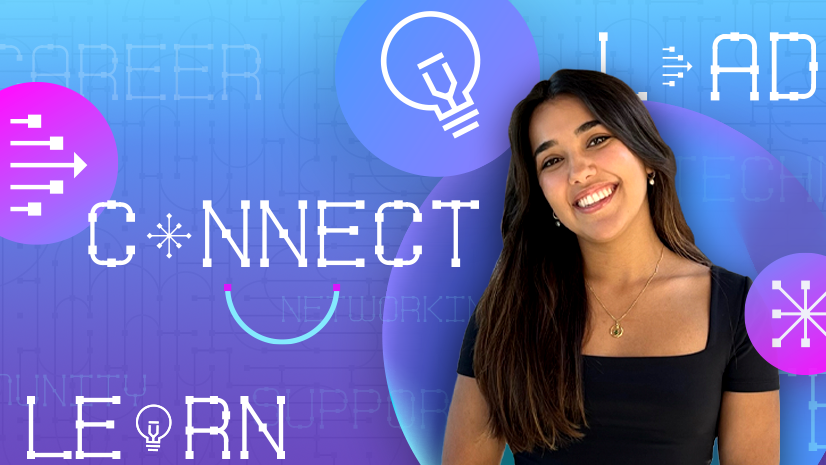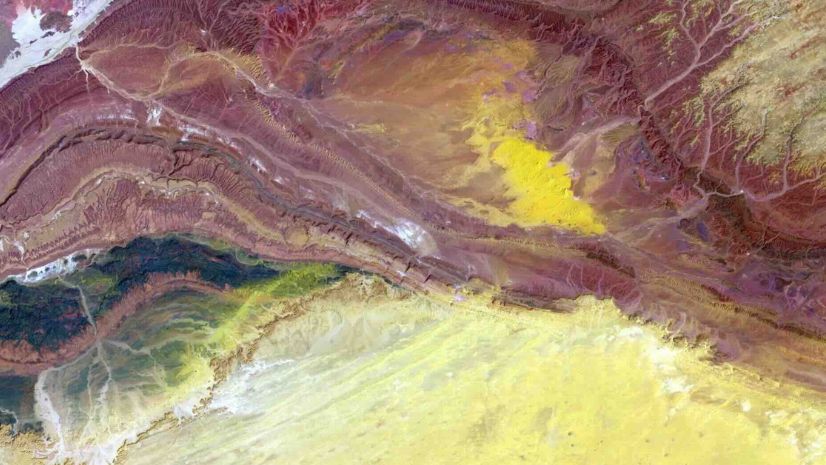In this Faces of YPN article, we highlight Catherine DuBreck, an accomplished GIS change management consultant and undergraduate instructor.
We connected with Catherine in her quest to become a YPN Content Ambassador after publishing the blog post “A Guide to Proactively Seek Internships at Any Stage in Your Academic Career“. During her undergraduate studies, her initiative and tenacity to seek out internships is what inspired us to capture her story. All her undergraduate internships stemmed from sending a personalized outreach email to the leaders of the companies she was interested in, asking about internship opportunities—even in the absence of job openings. Using that tactic, she secured three internships that led to where she is today—a successful and thriving GIS professional.
“Do not be afraid to put yourself out there. Send that email to ask about an internship, even if nothing is posted to their website.Beokay with being uncomfortable.” —Catherine DuBreck, GIS Change Management Consultant and GIS Instructor
Learn about her journey in this Q&A.
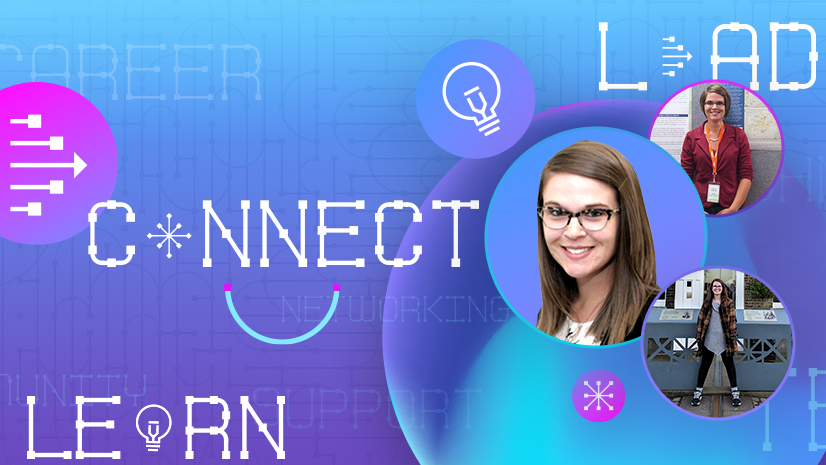
Q: How did you get your start in GIS?
A: In college, I was undecided on my major. I thought I was going to do physics and biology, and neither worked out. I needed to declare a major, and I happened to take an intro to urban planning course, which was in the geography department—and it fit my environmental minor. At the end of the semester, I declared my major as geography. And the following semester, I took my first GIS course and loved it! It was fun and cool to map my own maps.
Q: Did you do any internships in college?
A: During my time in college, I completed three internships, all of which I secured through reaching out to various organizations. My focus was on planning-related internships, inspired by urban planning classes I took. I began by researching organizations in cities I was interested in, and ultimately chose Boston, Massachusetts, for my summer internship. I discovered a transportation planning organization and identified the executive director’s email from their website. I reached out, introducing myself and expressing my interest in learning more about their work and seeking internship opportunities. The executive director responded promptly, leading to a phone interview with other members of the organization.
As a result, I was hired as a summer intern! Although I didn’t work extensively with GIS during this internship, I had the chance to interact with transportation planners who used GIS and learn from them.
As the summer internship concluded, I used the same approach to secure a fall semester internship with a county planning department where my college was located. By sending a similar email with some minor changes, I was hired as an intern in my college town. This internship offered more GIS-related work compared to the one in Boston.
The experience and skills I gained from these internships led to a third opportunity with the same county planning organization as a GIS intern for the spring semester. In this role, I updated county maps and created new maps for public use, further enhancing my expertise in GIS and planning.
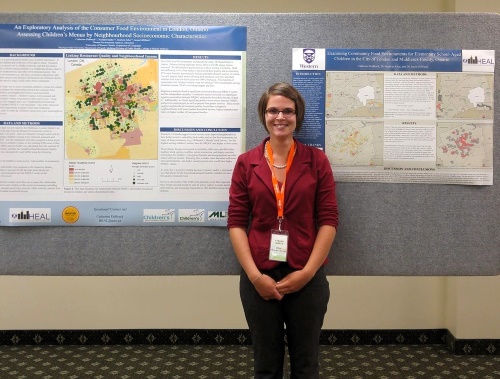
Q: What did you get from your internships to prepare you for the workforce?
A: Communication and taking initiative are big ones. How I landed all my internships was an exercise in communication. I gained a sense of confidence in my approach to asking executive leaders for an opportunity at an internship.
I also learned about general office skills and dynamics. Working in an office is a lot different than listening to your professor in class or working in a group with classmates. In an internship, you are working with a group of people in the field, learning from them, and observing how they interact, which I found to be incredibly valuable.
Q: How do you use GIS in your current role?
A: In my current role, I primarily serve as a GIS change management consultant. My main responsibility is to inform and train clients about the changes between different GIS products and versions. For instance, I document information about custom tools used by developers on specific projects. Many of our clients are transitioning from ArcMap and the geometric network to ArcGIS Pro and ArcGIS Utility Network. To facilitate this, I use ArcGIS Pro to take screenshots of custom tools and parameters and create documentation to guide clients in using these new tools, which may differ slightly from what they’re accustomed to.
I also create several dashboards with ArcGIS Dashboards that utilize new Utility Network data for our clients. While building these dashboards, I often use Arcade expressions to extract information from a specific feature service hosted on their ArcGIS Enterprise portal, enabling the creation of custom widgets. Discovering the possibility of creating custom widgets has been particularly exciting, as it allows me to continuously expand my knowledge of various GIS applications and uses.
Apart from my full-time job, I also teach Introduction to GIS as a part-time instructor for undergraduate students, where I use GIS applications to demonstrate the fundamentals of GIS.
Q: What is your best advice for someone just starting a GIS career?
A: Don’t be afraid! Put yourself out there. Send that email to ask about an internship even if nothing is posted to a website. Don’t be afraid to say, ‘I don’t know’ and ask for help. Take a few steps outside of your comfort zone and often good things will happen as a result.
Go to conferences. I used to not like public speaking and would get very shaky; it just wasn’t fun. I stepped out of my comfort zone and decided to submit abstracts for conferences or apply to be part of a poster competition. Those experiences have made me a better public speaker and now I feel more comfortable because I’ve gotten more practice. You can also step out of your comfort zone by leaving home for a long time. This can look like taking an internship in another city, like I had taken one in Boston. The point is, be okay with being uncomfortable.
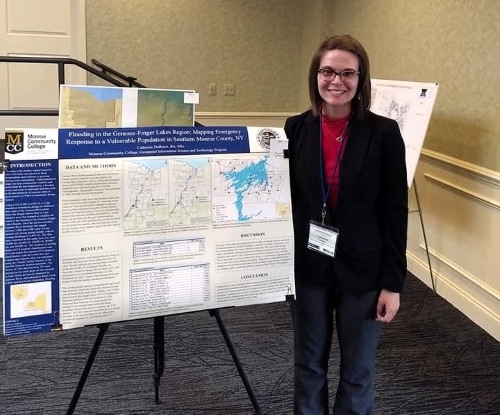
Q: What’s your advice for people attending conferences for the first time?
A: My advice for first-time conference goers is to remember that everyone started out being new to something. It can be overwhelming, especially if you’re attending alone, but initiating a conversation with a random attendee can make a significant difference.
For larger conferences, do not pressure yourself to attend every session. With so many great talks and sessions overlapping, it’s impossible to see everything. If you miss a session, connect with the speaker afterwards, and I am sure they will be more than happy to share their presentation with you. Prioritize your schedule ahead of time and intentionally plan out each day to include not only sessions, but networking activities as well.
Most people are happy to share their knowledge and chat with you, so take advantage of these opportunities to learn and network.
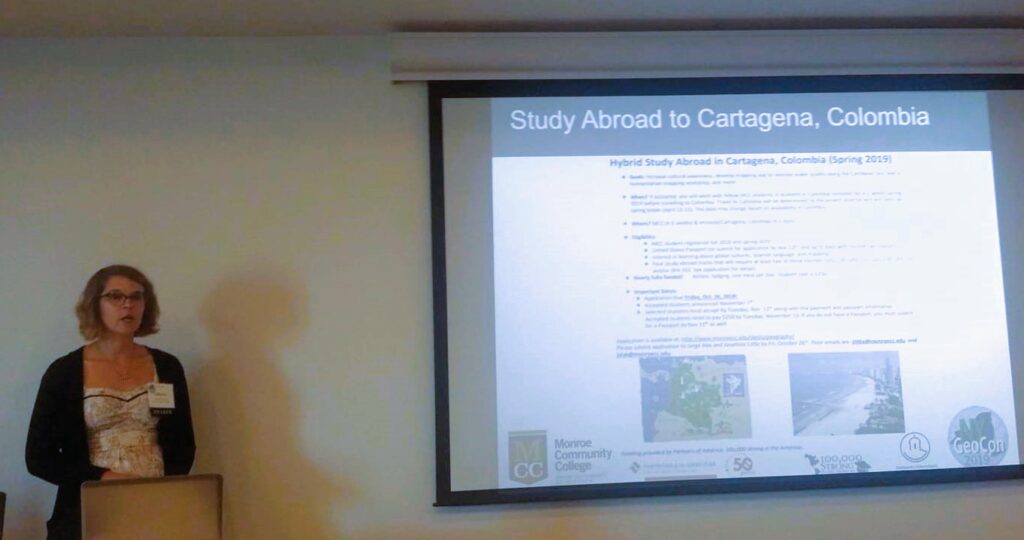
Q: What are some GIS career resources you recommend?
A: Use GIS job boards to get an idea of the types of GIS roles that are out there, including internships. In this blog post, I list various job boards that I recommend bookmarking.
Also, keep up with training, even if you are still in college. Esri has a ton of free training, like the MOOCs (massive open online courses) and Esri Academy courses. If you’re a student, it’s highly likely that your university or college has an organization license that includes training, so I recommend taking advantage of that.
Be involved with Esri YPN and become an active participant in the GIS community. You can do this through Esri Community.
Q: How do you stay motivated to keep up with training?
A: Understanding the rapid pace of change in GIS technology keeps me motivated to stay updated. Continuous updates in GIS tools, applications, and software keep me interested. For instance, I once took a course on ArcGIS Collector, which has since been replaced by ArcGIS Field Maps—this illustrates the importance of staying informed about GIS.
As an instructor, it’s crucial for me to be up-to-date so I can effectively answer student questions about GIS. Additionally, when working with clients or end users on new tools we’re developing, I need to provide accurate and current information. Ultimately, my motivation comes from the ability to help others by staying knowledgeable and informed.
You can learn more about the Esri YPN and our upcoming events—go to our web page.
Check out these additional resources for students in higher education or young professionals entering geospatial technology careers:
- Esri Community—Young Professionals Network (blogs, events, discussions)
- Esri YPN group on LinkedIn
- YPN Ambassador Program
- Join Esri YPN
- Esri Student Programs


